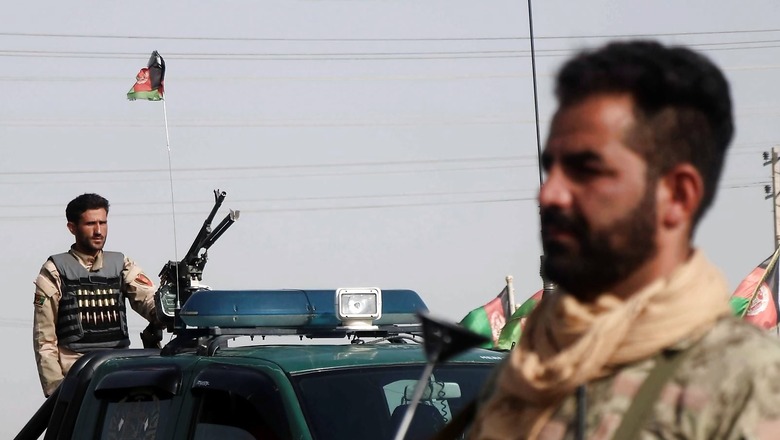
views
The international community will not accept a military takeover of Afghanistan or a return of the Taliban’s Islamic Emirate, the US said on Friday as a top UN official warned that Afghanistan descending into a situation of catastrophe would have consequences far beyond the borders of the war-torn nation. “The alarming rise in violence and civilian casualties caused by the ongoing Taliban military offensive further erodes the advances the Afghan people made in democracy and the rule of law over the last 20 years,” said Ambassador Jeffrey DeLaurentis, Senior Advisor for Special Political Affairs, US Mission to the UN.
“The Taliban must hear from the international community that we will not accept a military takeover of Afghanistan or a return of the Taliban’s Islamic Emirate, he said. Speaking at the Security Council meeting on Afghanistan convened under India’s current presidency of the 15-nation UN body, DeLaurentis said, “Taliban will be isolated and an international pariah if they choose that path, which would most certainly push the country to further violence and destruction.
He asserted that there is no military solution in Afghanistan and a negotiated, inclusive political settlement through an Afghan-led and Afghan-owned process is the only way forward for lasting peace and stability in the country. DeLaurentis reiterated Washington’s full support for an inclusive Afghan-owned and Afghan-led peace process with full and meaningful participation of women that leads to a just and durable political settlement.
He outlined that a just and durable political settlement must be based on inclusive governance; the right of Afghans to elect political leaders; protections for human rights, including rights of women, youth, and minorities; committing to counter terrorism, including to ensure that Afghanistan does not again serve as a safe haven for international terrorists and adherence to international law, including international humanitarian law. It is in the interest of all of Afghanistan’s neighbours to renew support for a negotiated settlement that brings the Afghan people the peace that they so urgently deserve, and creates a stable region. We welcome the role of the Secretary-General’s Personal Envoy, Jean Arnault, is playing in support of this objective, the American diplomat said.
The UNSC Special Representative for Afghanistan and head of the UN Assistance Mission in Afghanistan (UNAMA), Deborah Lyons, said there is an opportunity to demonstrate the commitment of the UN Security Council and the international community to prevent Afghanistan from descending into a situation of catastrophe so serious that it would have few, if any, parallels this century”. And let me assure you, such a catastrophe would have consequences far beyond the borders of Afghanistan. I do believe that the Security Council and the international community more broadly can help prevent the most dire scenarios. But it will require acting in unity and acting quickly. It will require acting, Lyons said.
Afghanistan’s Permanent Representative to the UN, Ambassador Ghulam M Isaczai, told the Security Council that it is our collective responsibility to stop the Taliban from destroying Afghanistan and threatening the world community. The scale, scope and timing of their military offensive is akin to an invasion unprecedented in the last 30 years of our conflict, he said, adding that since mid-April the Taliban and their affiliate foreign terrorist groups have launched more than 5,500 attacks in 31 of 34 provinces of Afghanistan.
These attacks have been launched with direct support of more than 10,000 foreign fighters representing 20 groups, including Al Qaeda, LeT, TTP, IMU, ETIM and ISIL who entered our country, and are fighting alongside Taliban against our population and security forces, he said. The Afghan envoy said the implication of allowing this network to continue to grow inside the country carries great security risk, not only for Afghanistan but also for the wider region and even the world.
This is a shared risk and concern to all of us as they are not the Taliban of the 21st century coming from the isolated madrassas but the manifestation of the nexus between transnational terrorist networks and transnational criminal organisations. Their links to drugs to smuggling and robbing of our natural resources is unprecedented, he said. “And those who encourage and participate with them of course are the beneficiaries. Therefore, this is not a civil war, but a war of criminalised and terrorist networks fought on the back of Afghans, Isaczai said.
He stressed that against this grim and disturbing situation unfolding in his country, it is high time for the Security Council to use “every means at its disposal to compel the Taliban to end their campaign of violence and terror against the Afghans, to prevent further bloodshed and urge them to return to return to talks. We ask the Council to use existing tools, including the effective implementation of the sanction regime under resolution 1988 and UN Security Council resolution 2513 to pressure the Taliban to engage in meaningful peace talks with the government negotiating team, Isaczai said.
Through resolution 2513, the 15-member Council called upon the Afghanistan government and the Taliban to pursue additional confidence-building measures including by reducing violence and releasing prisoners in good faith, thereby creating the conditions for a swift start to intra-Afghan negotiations leading to a durable peace.
Read all the Latest News, Breaking News and Coronavirus News here.




















Comments
0 comment